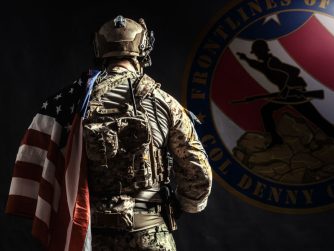During the Frontlines of Freedom show that played 1-2 Feb 14, I spoke with Billy Vaughn whose son, a Navy SEAL, was killed in a chopper crash in Afghanistan—this is not the crash from Lone Survivor—it’s another one; he wrote an incredibly powerful book entitled Betrayed. It includes an introduction by retired Army Lt Gen Jerry Boykin, who ran our nation’s special operations forces for years. Gen Boykin’s introduction is so powerful, that I’m now going to paraphrase some of it. My apologies to Gen B if I mess things up, but I’ll do my best. I’ve covered much of what he says on this show before—but the good general puts it in context—and this insight he brings is invaluable. Her we go.
As the sun rose over the beaches of Normandy on 6 Jun 1944, thousands of young Americans waded through the surf and raced toward the German defenses, intent on bringing WWII to an end and destroying the Nazi regime of Adolf Hitler. Each man on those beaches knew that he had the full support of his nation and of his chain of command. General Dwight Eisenhower, the Allied Commander, had taken a huge risk with an expectation of a huge payoff when he ordered the invasion. He was there to win, and he never contemplated anything else.
Those men who he’d ordered into combat had his full support, and he trusted commanders at all levels to do all they could to defeat the enemy and to protect the lives of their troops. His gamble paid off; his command succeeded, and Hitler’s forces were defeated, restoring sovereignty to the nations of Europe. But that was then.
Today, a new US warfare paradigm exists that would make the success of D-Day efforts doubtful if executed today. Warfare has always been an extension of politics, but after WWII, politics began to impede American war fighting to the extent that victory is fleeting at best and unlikely at worst. Furthermore, the risks to the troops have increased as a result of this shift. Commanders are often unable to employ their full capabilities or use their preferred tactics in order to defeat the enemy. The reason is simply that the political considerations have become so dominate that it is nearly impossible to win. Undoubtedly the nature of warfare has changed since WWII, but the imperative to defeat the enemy has not.
“Winning the hearts and minds” is a poor substitute for victory over a determined foe. If America does not intend to win, then US Forces should absolutely never be used to engage an adversary. “Nation building” should be done through the civilian communities–not using our warriors. Humanitarian projects are often effective and beneficial where the local infrastructure has been disrupted or destroyed, but the use of our military for these activities is ill advised due to the overpowering political influences. The imperative of providing American Forces with the tools and authority, including appropriate rules of engagement—that is when and where they can shoot–to achieve victory and to protect themselves should always dominate American war fighting. When commanders can no longer make every reasonable effort to ensure the safety of their troops—as is the case now in Afghanistan–they should terminate combat ops and withdraw. Unfortunately, American commanders in Afghanistan have been forced to deal with an unacceptable choice between meeting the political demands and fighting to win.
The Counter-Insurgency strategy that has been pursued by the last two administrations has not succeeded in destroying the Taliban nor in winning the war. Moreover, this strategy has produced the most restrictive Rules of Engagement in modern warfare, jeopardizing the lives of every military member there. Commanders have been forced to fight an enemy who knows our rules well and uses them against us. The days of boldness and audacity by small unit leaders in closing with and destroying and enemy are gone –replaced by tactics that add risk to our troops.
There is no greater example of the results of this approach to warfare than the tragedy of 6 Aug 11, in Afghanistan, when a US helicopter was shot down in a Taliban ambush, killing 30 Americans—including 15 men from SEAL Team 6, the same unit that killed bin Laden.
The book Betrayed tells the story that Billy Vaughn learned while seeking the details of their son’s death. After receiving a heavily edited copy of the after-action report of the incident, the Vaughns had serious questions about the event surrounding that operation. Simply wanting to know the facts about their son’s death, they asked some hard questions of the chain of command. They were shocked to discover that no effort was made to eliminate known threats around the landing zone before the Chinook landed, even though there were opportunities to do so. First they got half-truths and then they got lies—all this is a part of the new way our nation fights wars.
Folks, as we’ve been discussing on this show, our nation’s military is being led by more and more politically correct officers and civilians—and all this leads to greater danger for both our troops and our nation. If you’re not sure what to do about this, check out concernedveteransforamerica.org..



